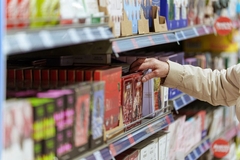
- Industry news
Industry news
- Category news
Category news
- Reports
- Key trends
- Multimedia
- Journal
- Events
- Suppliers
- Home
- Industry news
Industry news
- Category news
Category news
- Reports
- Key trends
- Multimedia
- Events
- Suppliers
Regulation can wait: EU postpones environmental rules to boost cereal production amid war

27 Jul 2022 --- As war rages on in Ukraine, the European Commission (EC) has come up with a package of measures designed to increase grain production across the EU and potentially plug the critical trade gap causing food insecurity worldwide.
The EC is proposing a temporary short-term derogation from rules on crop rotation and maintenance of non-productive features on arable land.
This will maximize the EU's production capacity for cereals aimed for food products, and is estimated to put back 1.5 million hectares in production compared to today.
Welcome relief to global grain problems?
A one year derogation of Common Agricultural Policy (CAP) rules involving crop rotation and maintenance of non-productive features on arable land will give farmers some improved maneuver margin to maximize their cereal production.
The Commission justifies the move due to the “uncertainties stemming in particular from the war in Ukraine.”
“Russia’s invasion of Ukraine has triggered a sharp commodity price surge and has an impact on the supply and demand for agricultural products at global level,” states the EC.
“In particular, global wheat output is at risk both from the supply shock stemming from the size of Ukraine and Russia’s share in wheat markets and from the shock in input costs, especially in natural gas, nitrogen fertilizer and oxygen,” underscores the body.
.jpg) The EC estimates its plan will add 1.5 million hectares of productive land.Helping end global hunger
The EC estimates its plan will add 1.5 million hectares of productive land.Helping end global hunger
With the new proposal, farmers will not need to have 4% of their crops destined for biodiversity purposes by 2023, being delayed until 2024.
Exemptions are made for crops that are used for feeding animals (animals and soy,) which will not be able to benefit from the derogation.
“Every ton of cereals produced in the EU will help to increase food security worldwide,” adds the EC.
“It is fundamental that the EU contributes to covering the production gap to address the global shortage of wheat and help address global hunger,” adds Janusz Wojciechowski, EU agriculture commissioner.
In March, the EC applied swift action to allow the production of any crops for food and feed purposes on fallow land, which resulted in a boost in sown areas of protein crops of about 2.2 million hectares. This will increase protein crop growth by 19% in 2022; furthermore, sunflower seed crops in the EU will also grow this year by 6.9%, according to the EC.
“While the EU is largely self-sufficient for food, with a massive agri-food trade surplus, and the EU single market can once again be expected to prove its ability to absorb shocks, there are increasing concerns about affordability due to high prices and inflationary pressures,” explains the EU council.
“[As a result] some consumers and food processors may move away from higher value products to cheaper ones,” the council highlights.
Green concerns
Delaying the new CAP rules will come at an unavoidable cost for the environment, as more land will need to be used.
“The EC proposal is a result of a careful balancing between global food availability and affordability on the one hand, and protection of biodiversity and soil quality on the other hand,” defends the body.
“The Commission remains fully committed to the Green Deal,” it highlights.
However, in recent months some back blows have been dealt to the EU’s environmental ambitions in the agricultural sector.
IFOAM Organics Europe flagged last month that the 25% organic farmland by 2030 is falling way short as most countries are off-target.
The European Court of Auditors also called into question the EC Climate Action report for the 2014-2020 years, saying that it was overstated by as much as €72 billion (US$73 billion). Grain prices are up 27% year-on-year.
Grain prices are up 27% year-on-year.
Additionally, another EC plan – released in June – to halve pesticide use by 2030 might be short-lived as countries have expressed their concerns with the target as they call for the need for viable, sustainable alternatives before setting obligatory reduction targets. Highlighting that sustainability can’t come at the price of food security or the competitiveness of EU agriculture.
Free ports, relieved markets
The offensive against high cereal prices continues as Ukraine and Russia reached a complex deal to unlock maritime food trade routes in the Black Sea, which had been under Russian blockade since the war started.
The deal will allow grain to flow freely toward global ports, unlocking 20 million metric tons of wheat.
However, Russia bombed the Odessa port, raising concerns that the grain deal is compromised.
Cereal prices reached their all-time high in May but started to ease quite precipitously in June, dropping by 4.1%. However, prices remain 27.6% higher than last year, with the case of wheat being even more dramatic as prices are 48.5% higher than in June 2021.
With the maritime deal and the EC measures, grain prices might continue their coveted descent. However, crops are under extreme heat pressures this summer, which will affect yields.
“In terms of specific EU agricultural markets, the dry and hot weather has put significant pressure on some arable crops. Production of cereals is now expected to be 2.5% lower than in 2021,” explains a report on the market situation by the EU Council.
By Marc Cervera











